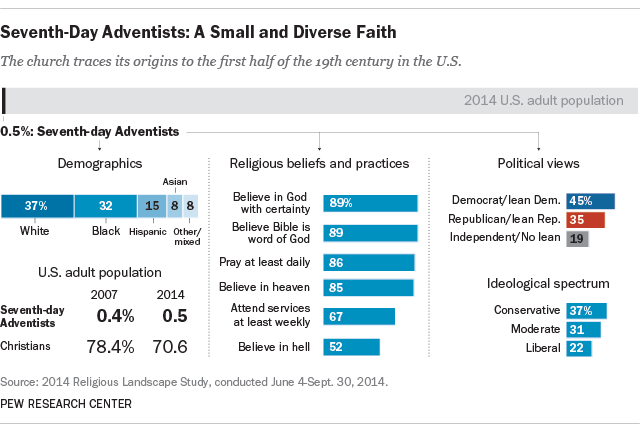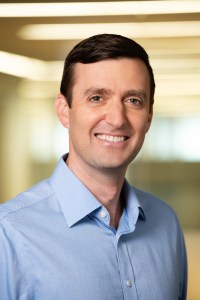
Ben Carson’s religion has been in the spotlight in recent weeks after Donald Trump, one of Carson’s leading rivals in the Republican presidential primary, mentioned it at a Florida rally. “I’m Presbyterian,” Trump said, according to media reports. “Boy, that’s down the middle of the road, folks, in all fairness. I mean, Seventh-day Adventist, I don’t know about. I just don’t know about.”
The Seventh-day Adventist Church, known for its observance of the Sabbath on Saturdays and some other unique beliefs and practices, traces its origins to the United States in the first half of the 19th century, when preacher William Miller built a religious movement around his prediction that Jesus Christ would return to Earth in 1844. Since then, the church has transitioned from being seen as a cult by some Americans to a more mainstream evangelical Christian denomination.
Here are a few facts about Seventh-day Adventists in the United States today, based on the Pew Research Center’s 2014 Religious Landscape Study:
Demographics
Seventh-day Adventists make up one-half of 1% of the U.S. adult population (0.5%), little changed from 2007 (0.4%). That stability stands in contrast to U.S. Christians overall, whose share of the population has dropped by nearly 8 percentage points (from 78.4% to 70.6%) over that same period.
Seventh-day Adventists are among the most racially and ethnically diverse American religious groups: 37% are white, while 32% are black, 15% are Hispanic, 8% are Asian and another 8% are another race or mixed race.
About seven-in-ten Seventh-day Adventists live in either the South (40%) or West (31%) regions of the U.S. Only about one-in-ten members of the denomination live in the Midwest, where Carson was raised (in Michigan).
Religious beliefs and practices
Seventh-day Adventists are extremely devout by traditional measures of religious observance. All Adventists in our survey say they believe in God, including nine-in-ten who are absolutely certain about this belief (89%). By comparison, 63% of all Americans say they are absolutely certain that God exists. Roughly eight-in-ten (83%) Adventists say religion is very important in their lives, compared with 53% of U.S. adults overall.
Fully two-thirds (67%) of Seventh-day Adventists say they attend religious services at least weekly, higher than most other Protestant denominations that are large enough to be analyzed in the survey. In addition, 86% of Seventh-day Adventists say they pray at least daily (compared with 55% of all U.S. adults).
A big majority of Adventists (89%) believe the Bible is the word of God, including about half (48%) who say it should be taken literally. And two-thirds (66%) say they look to religious teachings and beliefs as their primary source of guidance on questions of right and wrong, double the share of Americans overall who say this.
Most Adventists (85%) believe in heaven, but far fewer (52%) believe in hell. The relatively low level of belief in hell by Seventh-day Adventists stands out among evangelical Protestants, 82% of whom say they believe in hell.
Social and political views
After Carson’s announcement that he would run for president, the Seventh-day Adventist Church released a statement emphasizing its political neutrality. While Carson (along with 35% of Seventh-day Adventists) is a Republican, many in the denomination identify with or lean toward the Democratic Party (45%). About one-in-five (19%) Adventists identify as political independents or do not lean toward either party.
Adventists also are spread out across the ideological spectrum: 37% say they are conservatives, 31% identify as political moderates and 22% say they are liberals. Interestingly, about half of Adventists (53%) favor a bigger government with more services, while four-in-ten prefer a smaller government (42%).
Carson has compared abortion to slavery and called for it to be banned in all circumstances, but Adventists are actually somewhat divided over abortion. About four-in-ten (42%) say abortion should be legal in all or most cases, while 54% say it should be entirely or mostly illegal. This latter group includes one-in-five Seventh-day Adventists (19%) who take Carson’s view that abortion should be illegal in all cases.
Seventh-day Adventists are more united in their opposition to homosexuality and same-sex marriage. About six-in-ten (59%) say homosexuality should be discouraged by society, and a similar share (63%) oppose allowing gay and lesbian couples to marry legally.
Fully two-thirds of seventh-day Adventists (67%) reject evolution, saying that humans have always existed in their present form. This mirrors Carson’s view: The candidate has been a vocal critic of evolution, saying that it is impossible to believe in both God and evolution.



